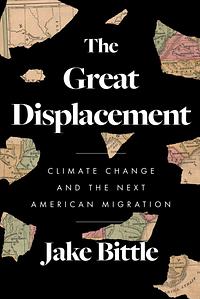Take a photo of a barcode or cover
informative
medium-paced
Informative and a good anthology of tragedies that will only increase as the climate collapse continues to unfold. But the format can get repetitive and I wish he'd made stronger conclusions.
informative
medium-paced
challenging
informative
reflective
sad
medium-paced
3.5 ⭐️ please take my rating with a grain of salt because I have come to the realization that while I love nonfiction audiobooks I just can’t physically read nonfiction. It literally feels like a chore (especially during my fun goofy Rick Riordan summer). This book took me reading it off and on from February to July and considering the book is less than 300 pages it’s just not a good look (mostly for me, somewhat for the book). This book was very informative and I did learn quite a bit but it just wasn’t engrossing until the last two sections.
Bittle definitely did his research for this book and the amount of first hand experiences he got was quite impressive. However, I found that since he used examples of so many people’s climate displacement stories it started to feel repetitive even when the stories were very different because the main points were the same. I think for me this book really shines in the last two sections where Bittle discusses more of the less discussed or considered climate impacts that will cause displacement (reoccurring floods and heat) and the trends of how people disperse after climate disasters and what that will mean for the populations of more temperate/climate protected states and cities. Both sections raised points that I had not experienced, considered, or talked much about in my college classes.
So, All In all read at your own risk as it has its good parts but it felt like a literal chore to get through.
My final takeaway is this: Michigan is looking pretty good right about now
challenging
emotional
informative
medium-paced
This book is a great complementary book to other climate commentaries, specifically adding a slew of first hand stories of those people who have already experienced the impacts of climate change — and forecasting similar stories that will play out this century.
As droughts, hurricanes, wildfires, and floods break communities down to their core, they also “brittles social and economic order, widening cracks that have been there the whole time,” until eventually the pressure builds enough where climate change physically pushes people around, causing displacement: movements that are “unpredictable, chaotic, and life-changing.”
“This book tries to illuminate the climatological forces that push climate migrants our of their homes and the political and economic structures that determine where they end up, but it also tries to memorialize the many places that climate change will force us to abandon.”
It does this by traveling across the country, telling stories of people on the edges of disaster — from farms and homes destroyed in Key West to insurance rates skyrocketing after wildfires in California to the disappearance of entire tribes from eroded land in Louisiana to homes benign designed improperly like in Houston and built in the wrong place to begin with like in Norfolk, Virginia — and the frustrating, time-sucking, and expensive reality of being stuck without a home after climate change pushes people out.
Bittle also tells the story of inequality, housing crises, and the tough decisions that governments and communities face when determining whether to leave or stay or how to adapt.
“The world is already being remade, but its future is far from set in stone. The next century may usher us into a brutal and unpredictable world, a world in which only the wealthiest and most privileges can protect themselves from dispossession, or it may usher un into a fairer world — a world where one’s home may not be impregnable, but where one's right to shelter is guaranteed.”
As droughts, hurricanes, wildfires, and floods break communities down to their core, they also “brittles social and economic order, widening cracks that have been there the whole time,” until eventually the pressure builds enough where climate change physically pushes people around, causing displacement: movements that are “unpredictable, chaotic, and life-changing.”
“This book tries to illuminate the climatological forces that push climate migrants our of their homes and the political and economic structures that determine where they end up, but it also tries to memorialize the many places that climate change will force us to abandon.”
It does this by traveling across the country, telling stories of people on the edges of disaster — from farms and homes destroyed in Key West to insurance rates skyrocketing after wildfires in California to the disappearance of entire tribes from eroded land in Louisiana to homes benign designed improperly like in Houston and built in the wrong place to begin with like in Norfolk, Virginia — and the frustrating, time-sucking, and expensive reality of being stuck without a home after climate change pushes people out.
Bittle also tells the story of inequality, housing crises, and the tough decisions that governments and communities face when determining whether to leave or stay or how to adapt.
“The world is already being remade, but its future is far from set in stone. The next century may usher us into a brutal and unpredictable world, a world in which only the wealthiest and most privileges can protect themselves from dispossession, or it may usher un into a fairer world — a world where one’s home may not be impregnable, but where one's right to shelter is guaranteed.”
challenging
informative
reflective
medium-paced
I agree with what some others have said about the pacing of this book; there may have been a few too many examples to keep it engaging. It worked well as an audiobook on my commute, though! It was thought provoking to follow the current policies and economic processes related to disaster relief and climate change to their logical conclusions over the next century, including the nuts and bolts of housing market collapses and insurance failures. In that way, this almost felt like a nonfiction companion to Parable of the Sower, painting a picture of an America where the majority of people are eventually homeless/displaced. This is even more timely with the growing criminalization of homelessness across the country. I felt like the book was a bit politically ungrounded, especially when so few pages were devoted to explaining the policy recommendations at the end. It felt a bit contradictory of the author to acknowledge where our government and capitalism has gotten us, including the admission that we are nowhere near limiting warming to a livable amount, and then primarily suggest reforms to the current system. This threw me off because the author proceeded to make an argument for the universal right to housing, as if that is possible within a capitalist system. I wonder if the author was trying not to alienate his audience by sounding too leftist, but for me it left some dots unconnected. Overall, this feels like an important book for my generation as we plan for our futures. It definitely made me think more deeply and realistically about where I want to invest my money and time for the next few decades.
informative
emotional
informative
reflective
medium-paced
challenging
hopeful
informative
sad
medium-paced






